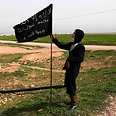
Afghanistan already here
Analysis: Global jihad spreading like cancer throughout Middle East; Israel preparing for the worst
More than 30,000 global jihadists have settled in and are fighting in countries that border with Israel. They belong to various groups, but they all have one dream: To liberate the Arab world from heretic regimes, with the climax being the liberation of Jerusalem. Afghanistan is already here; on our border.
Global jihad is the main concrete threat the army will be preparing for in 2014, and it is the focus of discussions the defense minister is holding with the General Staff ahead of the next working year. While not all of the IDF's top officers accept the term "Afghanistan is already here," there is broad agreement regarding the scope of the threat this development poses to Israel.
The argument is about the timetable: Is global jihad approaching the time when it will turn its attention to "take care" of the State of Israel, or does it need more time to establish itself on the ground and complete the mission of "taking care" of the heretic regimes of Assad, King Abdullah, General al-Sisi and others? IDF operational officers identify the jihadi threat as immediate. Army officials specializing in assessment are more cautious.
All the incidents that occurred along the borders between Israel and its neighbors since August 2011 involved global jihadists. The expected threat consists not only of the firing of rockets and missiles. Global jihad will try to breach the border and paint in the heart of Israel a picture of terror attacks similar to the one that is seen in Iraq and Afghanistan on a daily basis.
Never better?
The global jihad threat is a direct result of the Arab Spring. Just as the turmoil the region experienced between 1979 and 1982 (from Khomeini's rise to power to the Russian invasion of Afghanistan and the first Lebanon war) led to the rise of extremist forces such as al-Qaeda, Hezbollah, Hamas and the Taliban, global jihad was drawn into the vacuum left by the collapsing regimes around us.
The army is also discussing the supposed discrepancy between the sense that the Middle East has shifted from a reality of crises to a reality of agreements and the intelligence assessments indicating that the potential for an explosion remains high. There are talks with Iran, dialogue with Syria and negotiations between Israel and the Palestinians. The security establishment sees another positive development in the dramatic weakening of the Muslim Brotherhood in Egypt. Seemingly, our situation has never been better.
But all of these processes are expected to exhaust themselves towards May-June. The Iranians are talking about a solution within six months; the Syrians are supposed to get rid of their chemical weapons and head for elections in the summer of 2014; and Israel and the Palestinians need to reach an agreement by April. What if these processes fail to yield results? Where will that put the State of Israel?
The only element in the Middle East that these processes have no effect on is global jihad. The dismantling of Syria's chemical weapons and the plan to reach a political agreement with the opposition in Syria does not interest global jihad. Lately there have been more and more clashes not only between global jihad and the Syrian army, but also between jihadists and moderate rebels. Global jihad settles in every area that is vacated in Syria, including the Deraa region, which is not far from the Israeli-Syrian-Jordanian border triangle. If they get a foothold in the Golan Heights, Israel will not be able to remain indifferent.
Meanwhile, this cancer is spreading, and no one can stop it. Who'll be able to expel from Syria those tens of thousands of global jihadists? The Egyptians estimate there are some 3,000 jihadists in Sinai. Some of them are connected to the Syrian Jabhat al-Nusra group, while others are affiliated with al-Qaeda's branch in Yemen. In Lebanon several hundred Sunni-Lebanese are operating under the auspices of Syrian global jihad groups. Hezbollah is having a hard time dealing with groups such as the Abdullah Azzam Brigades, which launched rockets at Israel and detonated car bombs in Beirut's Dahiyeh district. In Gaza there are also a few hundred global jihadists, who pose a threat to the Hamas regime.
Has the Middle East missed the train?










